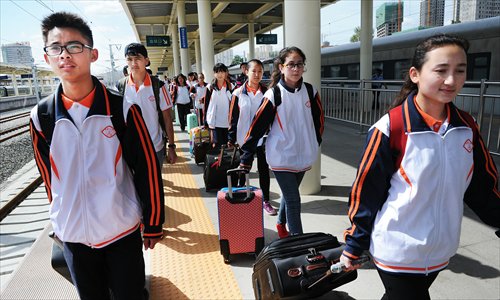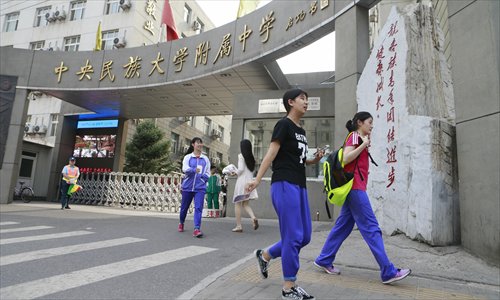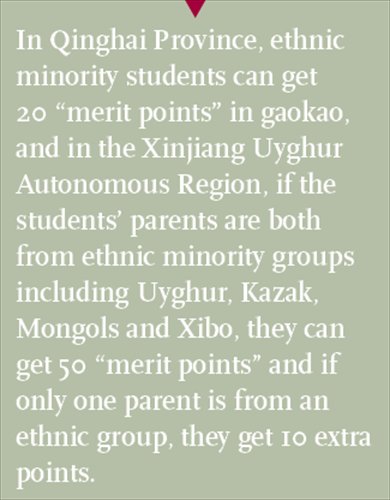Beijing parents protest against ‘favorable treatment’ of ethnic students in college entrance exams
Beijing parents are protesting against a high school which recruits ethnic minority students from all over the country and takes a big chunk in the recruitment by top universities under a favorable government policy for ethnic students.

Xinjiang students attending school in Beijing and Shanghai arrive at the Urumqi railway station as they return home for holiday. Photo: CFP
As the national college entrance exams kick off on Tuesday, one school in Beijing finds itself on the firing line from parents who are anxious about their children's chances to get into elite universities.
The High School Affiliated to Minzu University of China in Beijing boasts an impressive college admission rate. Different from other prestigious high schools in the city which mainly consist of locals, this school has students with ethnic minority background from all over the country.
While those students were not allowed to take gaokao in Beijing before, a policy issued by the Ministry of Education (MOE) in 2003 changed their life and offered them the same competitive opportunities as Beijing students. Bonus points for most ethnic minority students put them at a greater advantage in the exams.
But for Beijing parents, this is a nightmare: the quota of seats in top universities of Beijing has been encroached upon by the school.
"The Minzu high school caught my attention in 2015 because its students outperformed the local Beijing students in gaokao, affecting the rankings of local students," said Beijing resident Dong Jie (pseudonym), whose son is taking gaokao this year.
In 2015, Peking University and Tsinghua University altogether enrolled 356 students from Beijing, with 14 percent of these students coming from the Minzu high school.
Thinking the school harms their children's rights, hundreds of Beijing parents including Dong formed a group and began to protest against it to MOE and Beijing educational authorities since last year.
"We still don't know whether our protest will work. We will wait and see this year," said Dong.
"The large-scale recruitment of students from all over China by the Minzu school has a bad influence on the ecology of education in Beijing. It will deepen the inequality among schools," said Chu Zhaohui, a research fellow at the National Institute of Educational Sciences.

Students exit the Middle School Affiliated to Minzu University of China in Beijing. Photo: Li Hao/GT
A dark horse
In China, students have to have local hukou, or household registration, to take gaokao in a particular place, and non-local students still have to go back to their home provinces for gaokao even they have attended school in big cities.
In 2003, the MOE released a document which authorized Minzu high school to enroll ethnic minority students mostly from western regions, and such students were allowed to take gaokao in Beijing.
At the beginning, the high school didn't get much attention as their students, who got admitted through recommendations, did not perform well in gaokao. This changed after Tian Lin, who became the school's president in 2005, started the policy of independent recruitment.
Since then, the school has seen a rapid rise in its profile. In 2014, more than 400 out of the school's 574 students got enrolled in elite universities. Some 47 of those students got admitted into Peking and Tshinghua universities.
"The school enrolls good students from all over China to compete with Beijing students. This is unfair," said Zhang Li (pseudonym), a local Beijing resident.
While Zhang's son just entered primary school, she is zealously advocating for the protection of what she views Beijing students' gaokao rights.
After reading about the Minzu high school online, she joined more than 800 other Beijing parents in a QQ group. There, they share information about the school and organize protests against the school.
In August 2015, more than 100 Beijing parents held a protest outside the MOE, in a bid to draw the authorities' attention to the school.
"In the policy document, the MOE stipulated that the school can enroll ethnic minority students and ethnic minority students from western regions. This sentence doesn't make sense. Why do they distinguish ethnic minority students from ethnic minority students from western regions?" Zhang asked.
Besides, it didn't specify how many students they can enroll. So the school can interpret it to its advantage, she added.
In discussions with the MOE and Beijing educational authorities, "the authorities said this year the students from the Minzu high school won't occupy Beijing's quotas. But we really don't know what will happen this year. We will wait and see after gaokao," Zhang told the Global Times.

Controversial policy
The special provision for the Minzu high school is a kind of policy support for ethnic minority groups. Apart from it, most ethnic minorities in China enjoy bonus points in gaokao.
In Qinghai Province, ethnic minority students can get 20 "merit points," and in the Xinjiang Uyghur Autonomous Region, if the students' parents are both from ethnic minority groups including Uyghur, Kazak, Mongols and Xibo, they can get 50 "merit points" and if only one parent is from an ethnic group, they get 10 extra points.
According to an online poll by the China Youth Daily in 2014, 69.2 percent of 46,659 respondents said they had classmates who got "merit points" for gaokao and 84.3 percent said they did not support this policy. Some 64.3 percent of the respondents believed the "merit point" system is detrimental to the interests of other examinees.
"In those days, my school would grant the ethnic minority students 'special favor.' As they can get extra points, it will be easier for them to be admitted to Peking University and Tshinghua University," Ma Li, a student at Northeast University, told the China Youth Daily.
Ma pointed out that from an individual perspective, this is unfair. "Also, many students 'ethnic minority identity is questionable."
In 2009, 31 students at the Bashu Middle School in Chongqing who got 20 merit points were found to have faked their ethnic status, according to the Southern Weekly newspaper.
Chu Zhaohui told the Global Times if an ethnic minority group has the same access to education as Han people, they should not be awarded the "merit points."
"Only if they are living in backward regions and Putonghua is not their commonly used language, the ethnic minority groups should get some extra credits," said Chu.
Pan Zhiping, a research fellow at the Xinjiang Academy of Social Sciences, told the Global Times that the merit point system for ethnic minorities has had a good effect in the past, as it helped to cultivate talents from ethnic minority groups.
But as time changes, the value of the policy is becoming questionable. "One of the loopholes of the policy is that while it favors ethnic minorities, in practice, only the ethnic minorities living in the cities get the benefit," he said.
Take Xinjiang as an example. Students living in the downtown area of Urumqi already have access to good education. But they still get the same bonus points as those living in the rural areas of Hotan. But those in Hotan can't compete with those in Urumqi in gaokao, said Pan.
The second problem with the policy, according to Pan, is that it can lead to "reverse discrimination."
Pan said that in Hotan, 3 percent of residents are Han while 97 percent are Uyghur people. While Uyghur students get the bonus points, Han students get no support. "This is 'reverse discrimination.' Many Han people are moving out of Xinjiang because they're unwilling to accept this situation," he said.
"Instead of allocating bonus points based on ethnic groups, it's better to give bonus points to students who are living in the remote and backward areas," Pan noted.
Regional disparities
Pan Zhiping told the Global Times that for the students enrolling with the Minzu high school, its kind of a "gaokao migration."
"They choose to take exams in Beijing, because the place has a higher number of admission quotas for good universities than many other places. Gaokao is comparatively easier for Beijing students," said Pan.
Zhang noted that when she took gaokao back in 2000, Beijing had a bigger advantage over other places. "But now Beijing is losing this advantage. The government is cutting recruitment quotas for Beijing in many of the good universities these years," she said.
According to Zhang, in 2015, Peking University enrolled 184 students from Beijing, and Tsinghua University 170, while Fudan University in Shanghai enrolled 849 local students and Shanghai Jiao Tong University 849.
"We cannot get admitted to Tsinghua and Peking universities with only 400 points as many people said online. It's hard for us," she said. "Beijing parents need to make our voices heard, but we aren't as loud as others to be noticed."
In May, protests broke out in several cities in Jiangsu and Hubei provinces when the college admission scheme showed that a larger quota will be allocated to students from western regions. Later, education authorities re-assured the parents that the quotas will not affect the admission rate of local students from the respective provinces.
The admission rate of local students in first-tier cities in Jiangsu is about 10 percent, less than half of Beijing's rate.
While provinces including Jiangsu and Hubei were ordered by the MOE to allocate higher admission quotas to the students from the less-developed regions, Beijing, which is home to the largest number of top universities in the country, is not making such a sacrifice.
According to Chu, it is the current gaokao recruitment system in which the central government decides the universities' quota for different areas that creates a sense of unfairness.
"It's better to let the universities conduct independent recruitment. They can choose students based on their own requirements. And gaokao should not be the only criteria for admission. We can also introduce third-party organizations to determine different recruitment criteria for different regions," he said.
For Dong, the most important thing is to make sure that the educational authorities keep their promise. "If they fail to keep their promise, I still go to talk to them to uphold our rights," she said.
Newspaper headline: Reverse inclination